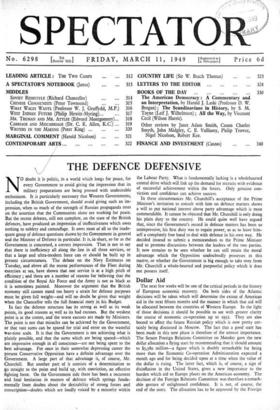THE DEFENCE DEFENSIVE
NO doubt it is politic, in a world which longs for peace, for every Government to avoid giving the impression that its military preparations are being pressed with undesirable enthusiasm. It is particularly necessary that Western Governments, including the British Government, should avoid giving such an im- pression, when so much of the strength of Russian propaganda rests on the assertion that the Communists alone are working for peace. But the recent debates, still not complete, on the state of the British defences, have produced an impression of ineffectiveness which owes nothing to sublety and camouflage. It owes most of all to the inade- quate grasp of defence questions shown by the Government in general and the Minister of Defence in particular. It is, in short, so far as the Government is concerned, a correct impression. That is not to say that there is inefficiency all along the line in all three services, or that a large and ultra-modern force can or should be built up in present circumstances. The debate on the Navy Estimates on Tuesday, and above all the recent performances of the Fleet during exercises at sea, have shown that one service is at a high pitch of efficiency ; and there are a number of reasons for believing that the condition of the Royal Air Force and the Army is not as black as it is sometimes painted. Moreover the argument that the British economy still cannot stand too heavy a strain for defence purposes must be given full weight—and will no doubt be given that weight when the Chancellor tells the full financial story in his Budget.
In fact the defence structure has its strong as well as its weak points, its good reasons as well as its bad excuses. But the weakest point is at the centre, and the worst excuses are made by Ministers. The point is not that miracles can be achieved by the Government, or that vast sums can be spared for trial and error on the wasteful war-time scale. It is that the Government is not achieving what is plainly possible, and that the sums which are being spared—which are impressive enough in all conscience—are not being spent to the best advantage. For once in their somewhat depressing career the present Conservative Opposition have a definite advantage over the Government. A large part of that advantage is, of course, Mr. Churchill. But another part of it consists of a determination to go straight to the point and build up, with conviction, an effective fighting force. On the Government side there has been a recurrent and fatal hesitation in matters of defence which springs funda- mentally from doubts about the desirability of strong forces and conscription--doubts which are loudly voiced by a minority within
the Labour Party. What is fundamentally lacking is a wholehearted central drive which will link up the demand for recruits with evidence of successful achievement within the forces. Only genuine con- viction and confidence can achieve success.
In these circumstances Mr. Churchill's acceptance of the Prime Minister's invitation to consult with him on defence matters shows a will to put national interest above party advantage which is most commendable. It cannot be objected that Mr. Churchill is only doing his plain duty to the country. He could quite well have argued that, since the Government's record in defence matters has been so unimpressive, his first duty was to regain power, so as to leave him- self a completely free hand to deal with defence in his own way. He decided instead to submit a memorandum to the Prime Minister and to promote discussions between the leaders of the two parties. It now remains to be seen whether he can still retain the moral advantage which the Opposition undoubtedly possesses in this matter, or whether the Government is big enough to take over from Mr. Churchill a whole-hearted and purposeful policy which it does not possess itself.






































